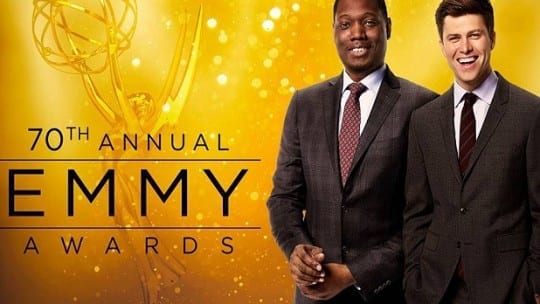
The 70th annual Primetime Emmy awards may have talked the talk about increasing diversity on television, but it did not walk the walk.
Despite numerous jokes and skits poking fun at the traditional snubbing of people of color in the entertainment industry, and the most diverse group of nominees in the history of the program, 22 of the 26 award winners were white.
The Sept. 17th show at the Microsoft Theater in Los Angeles began with a satirical musical number called “We Solved It,” intended to playfully address the industry’s ability to pat itself on the back for the slow strides it has made toward being more inclusive for non-white actors. In the context of the rest of the evening, however, the song sounded more like a self-deprecating dig, as it was made clear that issue remains unsolved.
Jokes by hosts Michael Che and Colin Jostin their opening monologue attempted to diffuse the tension, as they noted how diversity on TV has improved since the days of Cheers and E.R., both featuring all-white casts despite being set in racially-diverse cities.
Che also explained that his mother doesn’t watch the Emmys because it is a “white” show during which awardees never thank Jesus in their acceptance speeches, which he called back later on after the first six winners were all white actors and, indeed, did not talk about the lord on stage.
Finally, an hour into the program, Regina King won the Emmy for outstanding lead actress in a limited series or TV movie for her role on the Netflix program Seven Seconds, which ironically had just been cancelled. Before this, late-night host James Corden made a tone-deaf directive to get #EmmysSoWhite trending on Twitter, a reference to the similar hashtag that made the rounds before the 2015 Oscars and another reminder that things may not have changed as much as the show would like us to think.
Viewers on Twitter were quick to note the discrepancy between the diversity of the nominees and the actual winners, especially in regard to upsets like Atlanta’s loss in all six categories for which it was nominated, and Sandra Oh’s loss to Clare Foy for the Outstanding Lead Actress in a Drama Series award.
For all the self-congratulating and patting on the back the #EMMYs is doing tonight about how "diverse" it is, all the winners have been pretty monochromatic so far.
— Awesomely Luvvie (@Luvvie) September 18, 2018
Oh was the first Asian American actress to be nominated for the award for her work on the critically-acclaimed BBC America show Killing Eve, and Foy acknowledged her respect for the fellow actress on stage during her speech, indicating her belief that Oh should have won.
even claire foy recognizes that sandra oh should have won the emmy so i will accept that
— E. Alex Jung (@e_alexjung) September 18, 2018
Perhaps the most appropriate portion of the night was Che’s pre-filmed segment called the “Reparation Emmys,” in which Che gave awards to black actors from decades past who had never been nominated or awarded Emmys when their shows were on the air. This felt like one of the sole moments of the show that actually sought to resolve the Emmys inclusion problem, but it didn't seem to right the issues with the rest of the evening.
The Emmys has been called an outdated show that is past its prime, trying to hold on to its former prestige as ratings plummet (as indeed they did), and the events of last night’s show may well prove this to be true.
When we talk about authenticity for a brand, we remind companies that it is not enough to simply talk about their social responsibility initiatives while keeping business as usual behind the scenes. They must put their money where their proverbial mouths are and follow through. Likewise, it was not enough for the Emmys to tout the diversity of its nominees while keeping the winners overwhelmingly white.
Instead, jokes fell flat and viewers were reminded that when it comes to diversity, the Television Academy, and likewise society, still has a long way to go.
Follow Hayley: @that_hayley
